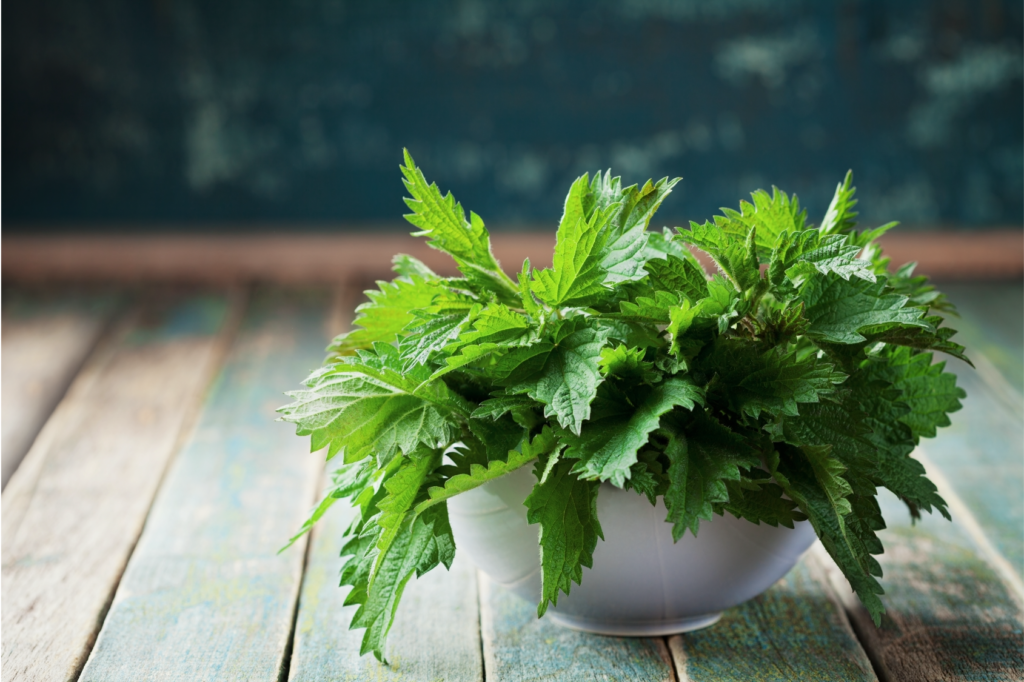By Kathy Abascal
It’s nettle time again, and we at the Loop have brought this story up to the top of our news for your convenience!
The nettles are up! All over the island, young nettles a few leaves high are there for the taking. Very soon, they will be tall and gnarly. So, if you live on or near land that has not been cleared and manicured to death, you should go gather nettles soon.
Nettles and man have evolved together, and nettles are extremely good to us, an occasional nettle burn notwithstanding. For eons, we have used nettles as food, as a medicine, and as a fiber. Nettles were once used to make cloth, and a Danish man from the Bronze age was buried wearing clothes woven from nettle. Once upon a time, you may have read the fairy tale “The Wild Swans,” in which the sister wove nettle shirts to break a spell cast on her brothers. As a child, I found that troubling, as my experience with nettles was limited to welts from nettle burns. Only later did I learn that nettle fabric can be as fine and soft as silk.
Nettles are very rich in vitamins and minerals. In the days before vegetables were flown in from South America or grown in greenhouses, nettles were a godsend at the end of a long, nutritionally challenged winter. They remain a godsend (although underutilized today) because they are a gourmet food that is unparalleled nutritionally and energetically. Do go gather some and sauté them with shiitake mushrooms and a drizzle of aged balsamic. Or make a rich nettle and potato soup. And while you are out picking nettles for dinner, pick some extra to dry for tea or freeze for later. If you dip them briefly in some hot water before freezing or eating them raw (as in a pesto), their stinging hairs will melt away.
Nettles are also a great medicine. They are often recommended to people with seasonal allergies, and there is some limited evidence that they can reduce those reactions. Nettles are also helpful for people with chronic ailments such as rheumatoid arthritis, acne rosea, and hepatitis C. This may simply be due to the plant’s ability to deliver good, easily absorbed nutrients It is also possible that the plant’s interesting constituents have a positive effect on the body’s inflammatory response. Nettle leaf is diuretic and increases the excretion of uric acid, suggesting that it might be a good helper for those with a tendency toward gout or some types of kidney stones.
All parts of the nettle have been used medicinally. At least four clinical trials show that its roots help reduce the symptoms of enlarged prostate. In one study, nettle root combined with palmetto berry was as effective as the prostate drug finasteride, but without the drug’s side effects.
Unfortunately, we need to be careful gathering nettle root in the Puget Sound area. Nettles are rather long-lived plants, and they concentrate minerals. This area, thanks to the Tacoma smelter, was over-exposed to cadmium, lead, and arsenic, and it is possible that these minerals are still concentrated in nettle roots. Note: Young shoots, however, should not present this problem, so it is ok to gather young nettles for food and tea.
Later in the season, you can also gather nettle seed. These seeds were often added to horse feed to promote shiny and healthy coats. An old German doctor reported giving his convalescent home patients one or two tablespoons of nettle seeds daily, and claimed they had a very energizing effect. Some modern herbalists also recommend nettle seed for the run-down and overly tired. Consider trying nettle seed if you, or someone you know, suffers from long COVID fatigue. The seeds can also be used as a hair rinse for extra shine.
Remember though, if you gather seeds later this summer and intend to consume them, first sieve them to separate them from other parts of the plant that may have those stinging hairs that make nettles so memorable.
I’ve barely scratched the surface of how to use nettles as food, cosmetic, and medicine, but I hope I at least have motivated you to put on your gloves and go gather some. They are one of our best local delicacies!

